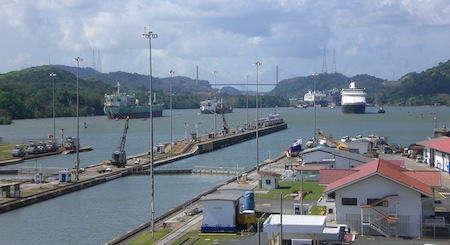Joshua Keating at Foreign Policy‘s blog Passport today points to the global ramifications of the widening of the Panamá Canal — a third lane is set to open in 2014, and it will allow much wider ships to pass through the Canal than the “Panamax” vessels currently designed to pass the Canal.![]()
The new lane, which will allow for more efficient ships — economically and environmentally — is expected to affect global trade and energy flows in multiple ways, absolutely.
It’s not quite as rosy as all that — the third lane’s opening date is now all but certain to be later — in 2015 (well after the date of the next Panamanian general election in May 2014).
Although the Canal’s expansion is indisputably an economic boon to the small Central American country, it may not be such a boon for the fortunes of Panamá’s current president, supermarket magnate Ricardo Martinelli, who swept into office in a landslide 2009 promising to restore Panamá’s record GDP growth rates following the worldwide economic slump in 2008.
Since the U.S. handed over sovereignty and control of the Canal to Panamá in 1999 (the result of a controversial agreement — at least in the U.S. — signed by Jimmy Carter in 1977), Panamá’s already solid postwar GDP growth skyrocketed. Starting in 2000, Panamá saw a rise in GDP growth that peaked at 12% growth in 2007 — it bottomed out at 3% in 2009 before bouncing back up to nearly 11% growth last year.
Much of that growth is of course linked to the Canal and construction and service industries tied to it.
Each successive administration has taken advantage of Panamá’s increased wealth: Mireya Moscoso, who came to power in 1999 and presided over the transfer of the Canal to Panamá, used Panamá’s economic prospects to strengthen social programs, especially for children. Her successor, Martín Torrijos, initiated the Canal expansion project in 2006, and tried to lessen political corruption in Panamá.
Martinelli has presided over the return to breakneck GDP growth, and he’s also enacted a fair share of legislative reforms, which have merited approving nods from global investors. As you might expect from a center-right businessman-president, Martinelli has enacted tax reforms to simplify tax collection, he has invested $20 billion into Panama’s infrastructure and he has championed the U.S.-Panamá free trade agreement, which was approved by the U.S. Congress and enacted into law by U.S. president Barack Obama in late 2011. But Martinelli has also enacted an increase in the minimum wage and instituted pensions for the elderly.
Given his success so far, given the return of the Panamanian economy to double-digit growth rates, and given the lead up to the opening of the Canal’s third lane, you’d think that Martinelli would stand to gain most of the credit for that. Instead, however, it’s much more unclear — Martinelli’s party is far from certain to make gains in 2014.
Continue reading The internal politics of the widening of the Panamá Canal
